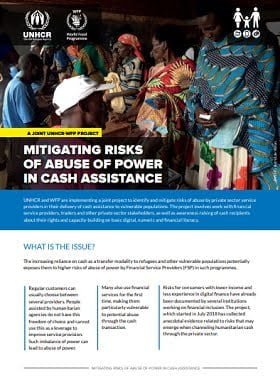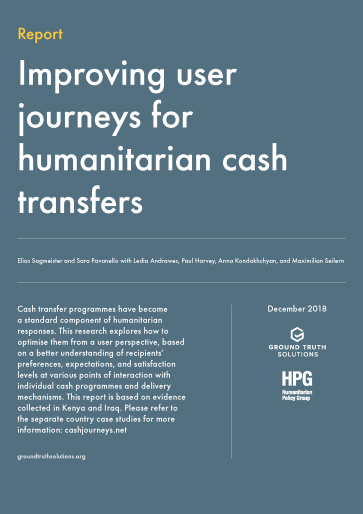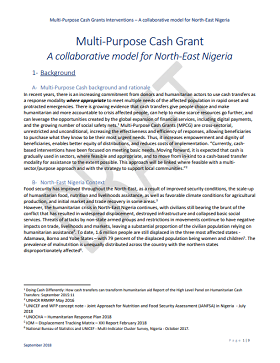Paiements numériques
Les technologies numériques transforment la manière dont nous répondons aux urgences. Les innovations sont multiples : elles concernent l’identification des personnes ayant droit à une aide, la collecte des données pour les évaluations et le suivi ou encore la communication aux communautés affectées par la crise. Les systèmes de paiement numérique, dont les appareils mobiles, les coupons électroniques et les cartes, lorsqu’ils sont utilisés de manière appropriée, peuvent accélérer, sécuriser et optimiser l’assistance, la rendant également plus inclusive. Toutefois, le volume de données personnelles que nous collectons, stockons et partageons augmentant, nous devons nous assurer que nos systèmes de protection des données restent pertinents et veiller à comprendre et atténuer les risques associés aux nouvelles technologies.
Contenu associé

Podcast: Is informed consent possible in humanitarian CVA?
Podcast
Episode 2 of the CashCast tackles data responsibility with Amos Doornbos, Linda Raftree, James Eaton Lee and Ric Tighe

Consent and Ownership in the Shift to Digital Cash and Voucher Assistance
Blog Post
Part of committing to cash and voucher assistance (CVA) is committing to going digital and collecting data. While they are two different things, they are deeply intertwined. And while an organisation can ‘go digital’ without cash programmes, it’s nearly impossible to commit to cash programmes in the long term without going digital. Yes, it is true we’ve done cash and voucher programmes...
Contenu récent

Mitigating Risks of Abuse of Power in Cash Assistance – 4 pages
Report
UNHCR and WFP are implementing a joint project to identify and mitigate risks of abuse by private sector service providers in their delivery of cash assistance to vulnerable populations. The project involves work with financial service providers, traders and other private sector stakeholders, as well as...

Identification Et Attenuation Des Risques D’Abus De Pouvoir Lies A L’assistance Monetaire Au Burundi
Rapport
Ce document présente les enseignements tirés de la mission conjointe HCR-PAM au Burundi visant à identifier et à atténuer les risques d’abus de pouvoir liés à l’assistance monétaire. L’analyse s’est focalisée sur l’assistance monétaire par téléphone mobile pour le retour volontaire...

Lessons in Driving Large Scale Change: the CALP Network’s reflections from the Humanitarian Innovation Exchange
Blog Post
The scaling of cash programming, enabled by mobile money, represents one of the most significant recent innovations in the humanitarian sector. In two guest blogs for Elrha (Enhanced Learning and Research for Humanitarian Assistance), our Director Karen Peachey explores the CALP Network’s role in...

Webinar: Help shape the Future of Financial Assistance report
Event
This webinar presented the scenarios and key issues arising from the CALP Network and IARAN's analysis and invited participants' input, ahead of the publication of the Future of Financial Assistance report

Mitigating Risks of Abuse of Power in Cash Assistance in Afghanistan
Report
This document outlines lessons learned from a joint UNHCR-WFP project in Afghanistan aimed at identifying and mitigating the risks of abuse of power in cash assistance. The cash transfer mechanisms discussed during the mission were cash distribution through Hawalas, mobile token, mobile e-vouchers and...

Data Responsibility: Let’s not wait for another wake up call
Blog Post
This blog is the second in a series on cash and voucher assistance (CVA) and risk. While the first blog busted some myths around misappropriation and fraud in CVA, this second blog looks into a specific risk for recipients of CVA: the risk of misuse of personal data.

Cash is no Riskier than Other Forms of Aid. So Why Do We Still Treat In-kind like the Safer Option?
Blog Post
The first in a new series of blogs on cash and voucher assistance and risk, this article from the CALP Network’s Stefan Bumbacher debunks some common myths around the risk of misappropriation and fraud in CVA.

Cash and Crises Series Episode I: Digital Money
Video
Cash and Crises is a series of financial literacy audiographics brought to you by CashEssentials, a private sector initiative with a social mission to support the relief and development community in understanding how cash is managed for society in times of crisis. In Episode 1, we start with a short...

The Digital Lives of Refugees: How displaced populations use mobile phones and what gets in the way
Report
GSMA in partnership with UNHCR conducted quantitative surveys and qualitative research to understand the ways in which refugees are using mobile phones in order to help guide digital interventions by humanitarian organisations and mobile network operators. The research identifies key trends, statistics,...

Displaced & Disconnected – Connectivity for Refugees
Report
UNHCR recognizes that one of the ‘hard stops’ in facilitating mobile connectivity and access to finance for displaced populations is non-conducive regulatory environments. In particular, ID-related legal requirements have proven a significant barrier to access. For example, a refugee who cannot...

Identification et atténuation des risques d’abus de pouvoir liés à l’assistance monétaire au Burundi
Rapport
Ce document présente les enseignements tirés de la mission conjointe HCR-PAM au Burundi visant à identifier et à atténuer les risques d’abus de pouvoir liés à l’assistance monétaire. L’analyse s’est focalisée sur l’assistance monétaire par téléphone mobile pour le retour volontaire...

Unblocked Cash Pilot Full Report
Report
This full report details the project scope, impact and learnings from the Unblocked Cash pilot in Vanuatu. The project was delivered in partnership with Oxfam Australia and ConsenSys, with funds from the Australian Government, and utilised a stablecoin, Dai, as the underlying value .

Kızılaykart Cash Based Assistance, Information Note
Report
Following the first refugee wave in May 2011, refugees from Syria has continued to seek asylum in Turkey. As a result of the open-door policy between 2011 and 2015, Syrians were welcomed by the Turkish government and obtained legal status under temporary protection. Subsequently, Turkey is hosting more...

Guide sur la sauvegarde des enfants dans les programmes de transferts monétaires
Guides et outils
L’objectif de ce guide est d’identifier les risques potentiels liés à la sauvegarde des enfants des les programmes de transferts monétaires et de fournir des suggestions sur la manière de les gérer (y compris le suivi et l’atténuation), afin que les enfants connaissent la plus grande...

Mitigating Risks of Abuse of Power in Cash Assistance – Workshop Nairobi, Kenya
Report
UNHCR and WFP are implementing a joint project to identify and mitigate risks of abuse of power by private sector service providers in the delivery
of cash assistance to vulnerable populations. The workshop, held in Nairobi on 10-11 December 2018, followed visits to the first two pilot countries,...

Cash for Shelter in Kenya – A Field Experience
Report
A study of a cash for shelter project in Kalobeyei that highlights how UNHCR uses cash assistance to help the refugees to transition to more durable solutions, in this case, integration with the host community. The project presents a paradigm shift from the traditional refugee camp planning process.

Improving user journeys for humanitarian cash transfers
Report
Humanitarian agencies are increasingly using digital payments, such as mobile money, pre-paid or smartcards, bank cards and electronic vouchers, to deliver cash assistance to affected populations. At the same time, the analysis and use of payment technologies have become more important, as have...

What I learned at the CALP Network’s Celebrating Digital Humanitarian Cash Event
Blog Post
This workshop was a triumphant but sad goodbye to ELAN, the Electronic Cash Transfer Learning Action Network. This was their closing event after four years of hard work, and they leave behind a rather magnificent legacy of tools, guidance, learning, webinars, resources and case studies on how to best...

Cash Week 2018: Looking around and looking ahead
Blog Post
Cash Week 2018 aimed to do two things: challenge us all to think differently about our work and to carve out a space to do so. In this blog, the CALP Network's Sophie Tholstrup reflects on the key debates from the week, and asks how we can build on this momentum and identify new ways of working to meet...

Multi-Purpose Cash Grant – A collaborative model for North-East Nigeria
Report
In recent years, there is an increasing commitment from donors and humanitarian actors to use cash transfers as a response modality where appropriate to meet multiple needs of the affected population in rapid onset and protracted emergencies. There is growing evidence that cash transfers give people...


